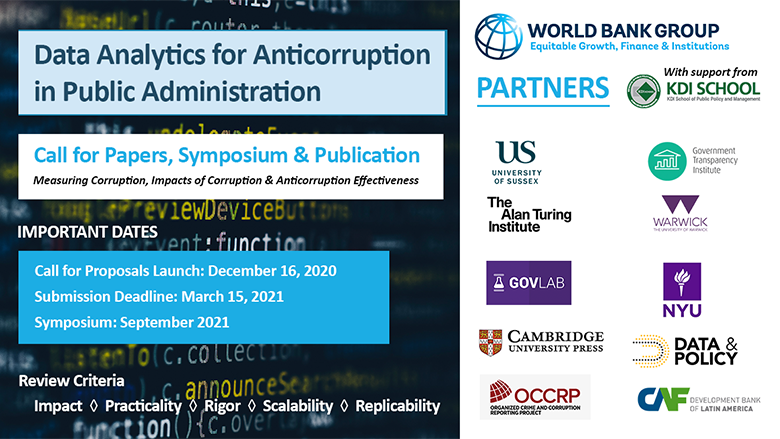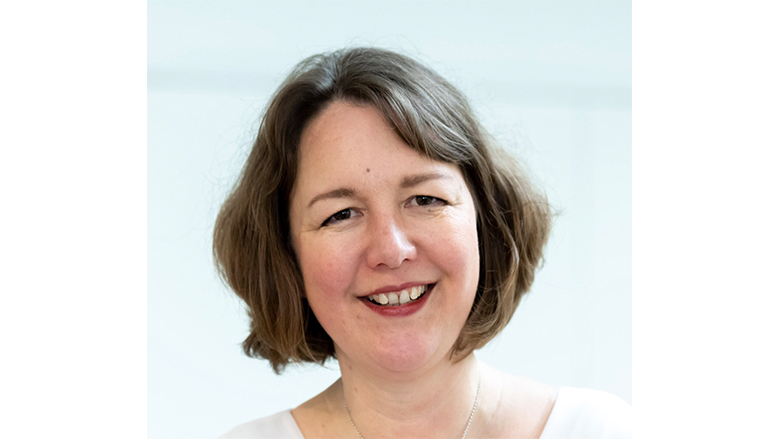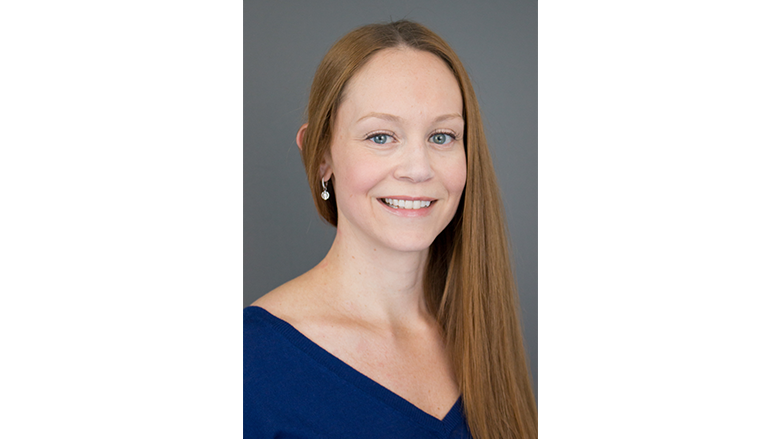Research Topic Guidelines
The increasing availability of open data generated by governments, the private sector and in the public domain is creating new opportunities to identify, measure and understand corruption risks. There is a need for a new generation of corruption measures and methods to supplement existing methods and indices. Current methods fall short of identifying the full range of corruption typologies, how these vary across and within countries, and across sectors or at different levels of public administration (state capture vs. corruption in the delivery of health services, for example).
There is also a need for data-driven metrics to identify and help analyze new and emerging types of corruption practices, such as those that underpin the global problem of illicit financial flows as well as new corruption risks made possible by advances in technology. The next generation of corruption measures needs to take advantage of evolutions in technology, the exponential growth in available data, and new data science methods and tools, to help transform how we measure corruption, identify new corruption typologies and risks, and assess the effectiveness of anticorruption policies and interventions.
This, in turn, will help governments design better policies and tools to prevent the harm of corruption from occurring, control corruption risks, and promote accountability for wrongdoing.
Researchers are invited to submit an abstract of 250 words for a paper demonstrating a practical application of data analytics in one of four areas:
1. New data-driven approaches to detecting and measuring corruption;
2. Using new data sources and methods to measure the impacts of corruption;
3. Using open data to assess the effectiveness of anticorruption tools, policies and interventions;
4. Contributing new knowledge that assists policymakers and researchers in addressing and overcoming ethical and technical challenges associated with data quality, privacy and access issues in the anticorruption field.
Setting the Scene
Detecting and measuring corruption, for example:
- What data sources and methods can we leverage to supplement existing corruption measurement methods and indices?
- What useful proxies for corruption are there that can be measured using open data; can these be validated and correlated with existing measures?
- What new data-driven methods could be used to measure corruption sub-nationally or for cross-country comparisons?
- What data driven methods could contribute to measuring progress in achieving SDG 16 of the Sustainable Development Goals?
- What innovative methods and data sources can be used to identify types of corruption that are not captured by existing surveys, indices and analytic methods , such as for example, state capture, contract steering, conflicts of interest, money laundering or the abuse of shell companies? Can we develop methods to assess the drivers of these types of corruption in different settings?
- Can we develop data-driven methods to identify risks that are specific to sectors, or different levels of public administration such as the delivery of goods or services in health, infrastructure and education?
- What sources of open administrative data could be used to diagnose corruption patterns, and how?
Measuring the costs of corruption, for example:
- How can innovations in data sources and methods allow for a more comprehensive understanding of the impacts of corruption, both monetary and non-monetary?
- How can we do a better job of quantifying the costs of corruption (nationally, sub-nationally or in specific sectors)?
- How can we better disaggregate the costs of corruption across governmental units (nationally, sub-nationally), different corruption sectors, or social groups or sectors of society?
- How can we use data analytics to estimate the costs of corruption on different indicators? Can these be used as part of forecasting?
- Can we propose data driven solutions to scale up existing diagnostic frameworks that have proven to be effective?
Assessing the effectiveness of anticorruption interventions, for example:
- What innovative methods and data sources can be used to assess the effectiveness of income and asset declaration systems and conflict of interest regulations in reducing corruption?
- Are there data sources and methods that could help assess whether the existence of whistleblower protections has a meaningful impact on other relevant indicators?
- Are there methodological advances that would allow a meta-analysis of the effectiveness of similar anticorruption initiatives (e.g., audits) across contexts?
- How best can findings and data be disseminated from anticorruption program evaluations?
Contributing new knowledge to help overcome challenges associated with data quality, access and privacy, for example:
- What policy relevant insights can we draw from anticorruption data analytics to help improve the way governments publish data?
- What are the potential policy implications on anticorruption interventions of new data privacy laws?
- What ethical and legal issues are raised by the use of data analytics to identify corruption risks?
Data Resources for Researchers
In the realm of public sector digital governance, e-procurement systems currently offer the richest source of open data for identifying and analyzing corruption risks in the intersection between public and private actors in the purchase and delivery of goods, works and services. Other types of open data are also increasingly available (in the extractives sectors, relating to the beneficial owners of legal entities, company structures and sanctions, remote sensing of supply chains or satellite imagery of infrastructure projects, and from the income, asset and conflict of interest disclosures of public officials, for example). Researchers are encouraged to think inside and outside the (public sector) box and are encouraged to use all available data sets that they can lawfully use, with a strong preference for open data to promote the replicability of the research method.
To assist researchers, a number of data sets and tools will be made available on request. Draft research abstracts outlining research questions, data needs, methods, and anticipated outcomes would be the basis for assessing requests. These tools all work with open data and are currently available as prototypes for research purposes. They include:
- A prototype of a Global Procurement Anticorruption and Transparency platform ProACT (encompassing data on 50 million contracts, 5 million suppliers and 8 million buyers from over 100 countries);
- A data pipeline of curated income and asset declarations data for selected countries (developed for the World Bank by a DSSG Summer Fellowship project);
- Extensive curated public data on government expenditures from Brazilian States, as well as electoral data, banned firms, and beneficiaries of government transfer programs, among others.
- A curated data lake with results of 200+ fraud risk filters enabling the detection of potential corruption in Brazil.
Anyone interested in using these data resources as part of their research should contact anticorruptionresearch@worldbank.org
Partners and researchers are invited to propose other open source data tools they think would be useful. Please send your suggestions or links to: anticorruptionresearch@worldbank.org
Submission Guidelines and Review Criteria
Submissions (abstracts) will be reviewed by a Panel of Experts comprised of anticorruption experts and data scientists from the World Bank, academic collaborators, and institutional partners. Submissions under the first three topic areas will be assessed against five criteria (submissions under the fourth category will not be assessed for scalability and replicability):
Impact Does the submission persuasively present a practical application of data science that will yield results that are useful for anticorruption policymaking?
Practicality Does the submission demonstrate that attention has been given to the availability and quality of the data required to conduct the analysis?
Rigor Does the submission demonstrate that thought has been given to the range of analytic methods that might be useful to generate statistical findings or insights, and to the need to validate the results and mitigate the risks of bias?
Scalability Does the submission use datasets, present methods and approaches which are scalable to a wide range of countries and settings? Do the authors discuss barriers and facilitators of scaling the proposed approach up beyond the scope of the study?
Replicability Has the submission explained how the author(s) will support the replicability of the method(s) used in their paper (either to repeat the same analysis undertaken or to apply to the analysis of a related anticorruption question or problem)?
Successful submissions (abstracts) will be invited to present their completed papers (methods, findings, insights) at a Symposium hosted by the World Bank in 2021. Authors will also have the option of submitting their paper and undergoing peer review for potential publication in a Special Collection of Data & Policy.
Language of Submissions
Abstracts submitted in English and Spanish will be considered for the Symposium. Only English language papers will be considered for publication in Data & Policy. Authors submitting abstracts to the Symposium in Spanish, who are interested in publication in Data & Policy, should indicate whether they are able to provide an accurate translation of the final published abstract and paper into English.
Important Dates
Call for Papers announcement: Wednesday December 16, 2020
Abstract Submission Deadline: Monday 15 March, 2021
Decision Notification: Friday 14, May, 2021
Final Manuscript Due: Friday 30, August, 2021
Symposium: September 2021
Deadline for submission to Data & Policy (optional): 30 October 2021
Data & Policy Special Collection Publication Date: May 2022
Data & Policy Guidelines
Submission to Data & Policy is optional. Authors do not need to follow the guidelines below in order to present at the Symposium.
If authors who have participated in the Symposium wish to be considered for the Special Collection in Data & Policy they will need to follow the Data & Policy Instructions for Authors (https://www.cambridge.org/core/journals/data-and-policy/information/instructions-for-authors#types) and submit the paper in accordance with those guidelines by the deadline of October 30, 2021. Instructions on where to submit will be provided to authors selected for participation in the Symposium.
The Data & Policy journal encourages authors to make replication data, code and other materials available via a recognized data repository, unless ethical or other considerations make this impossible: see the Transparency and Openness Promotion policy for more details.
(https://www.cambridge.org/core/journals/data-and-policy/information/transparency-and-openness-promotion)
Eventual submissions to the Data & Policy journal will need to include:
- A Policy Significance Statement: 120 words that succinctly describes the significance of the research for policymakers, in language accessible to a broad audience.
- A Competing Interest Statement,
- A Funding Statement describing any direct grant or other support that the work received.
- A Data Availability Statement explaining whether data, code and other materials supporting the findings are available, and if so, where readers may access them. In case they are not openly available, also specify that.
In the process of submitting to the journal, authors will be asked to select the relevant special collection from a dropdown menu (Data Analytics for Anti-Corruption), to provide five relevant keywords and to recommend reviewers. Papers accepted for publication that link to replication materials in the Data Availability Statement will be published with prominent Open Data and Open Materials badges to acknowledge the effort of the authors to engage in open practices.
Funding & Partnerships
This research program is supported with financing from the Korea Development Institute School for Public Policy and Management.
The World Bank is working with a number of institutional partners and academic experts on data analytics for anticorruption. These partners have agreed to contribute time and expertise to this research program and will participate alongside experts from the World Bank as members of the Advisory Board and Expert Panel (described below).
Institutional partners include the following:
Center for the Study of Corruption, University of Sussex
Government Transparency Institute
Cambridge University Press
Data & Policy Journal
Alan Turing Institute, University of Warwick
Development Bank of Latin America (CAF)
Organized Crime and Corruption Reporting Project (OCCRP)
Data Science for Social Good Project
Steering Committee & Advisory Board
A World Bank Steering Committee will oversee the delivery of the research program.
Steering Committee: Ed Olowo-Okere, Tracey Lane, James Anderson, Alex Habershon (World Bank)
An Advisory Board will define the research goals of the program, the agenda for the Symposium and may serve as peer reviewers and Guest Editors of the special collection of the peer-reviewed Data & Policy Journal. Members of the Advisory Board will also serve on the Expert Panel.
Advisory Board: James Anderson (World Bank); Francesca Recanatini (World Bank); Alexandra Habershon (World Bank); Liz David-Barrett (Centre for the Study of Corruption, University of Sussex); Brigitte Seim (University of North Carolina, Chapel Hill), Mihaly Fazekas (Government Transparency Institute), Marko Klasnja (Georgetown University); Stefaan Verhulst (The GovLab, New York University and Editor-in-Chief, Data & Policy).
Expert Panel
Submissions will be reviewed by an Expert Panel comprised of experts from the World Bank, development partners and academic institutions with expertise in one or more of the research topic areas in the call for papers. Their role will include:
- review of submissions under one or more of the research areas based on their area of expertise;
- participation in the Symposium by advising on a session, chairing a session and/or presenting their own work.
Members of the Expert Panels who wish to submit work for consideration for the Symposium will recuse themselves from reviewing submissions to which they have contributed.
Expert Panel Members (alphabetically)- List is not final
Jim Anderson, Lead Governance Specialist, Global Lead Anticorruption, World Bank
Liz David-Barrett, Director, Center for the Study of Corruption, University of Sussex
Erica Bosio, Program Manager, Growth Analytics, DEC, World Bank
Camilo Cetina, Lead Specialist, Public Integrity & Digital Innovation, Development Bank of Latin America (CAF)
Mihaly Fazekas, Scientific Director, Government Transparency Institute
Alexandra Habershon, Senior Governance Specialist, World Bank
Marko Klasjna, Assistant Professor, Georgetown University
Daniel Ortega, Senior Governance Specialist, World Bank
Emma Prest, Chief Technology Officer, Organized Crime and Corruption Reporting Project (OCCRP)
Francesca Recanatini, Lead Governance Specialist, World Bank
Carlos Santiso Corporate Director, Digital Innovation in Government Practice, Development Bank of Latin America (CAF)
Brigitte Seim, Assistant Professor, University of North Carolina Chapel Hill
Joel Turkewitz, Senior Counsel, International Monetary Fund, International Monetary Fund (IMF)
Stefaan Verhulst, Editor in Chief, Data & Policy Journal
Sebastian Vollmer, Associate Program Director, Alan Turing Institute, University of Warwick
Divyanshi Wadha, Junior Data Scientist, Indicators and Data Services, (SDGs) World Bank








